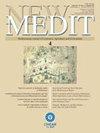Farmers’ perceptions of water management in Jemna oasis, Southern Tunisia
IF 1.2
4区 经济学
Q3 AGRICULTURAL ECONOMICS & POLICY
引用次数: 0
Abstract
Groundwater resources are a crucial driver of development. Since the 1970s, the expansion of irrigated land on the margins of the existing ‘traditional’ oases has been encouraged by the Tunisian authorities to enhance local development. As a result, oases in Southern Tunisia are currently facing sustainability concerns. This situation requires alternative water management approaches, in which local actors collaborate and contribute to the design of new rules. To understand Tunisian oasis farmers’ perceptions of water rules and public organisations, in 2021, we conducted an online survey in Jemna, an oasis in the Kebili region in Southern Tunisia. The picture that emerged from the online survey is that farmers in extension areas have distinctive characteristics but also similarities with farmers in the traditional oasis. Both types of farmers mainly cultivate date palm (monoculture), and, like farmers in the extensions, many farmers in the traditional oasis have a private borehole. All farmers in the Jemna oasis clearly perceive the limited availability and poor quality of the groundwater resource. However, they do not believe these problems cause conflict among farmers. They consider that, to solve possible conflicts and to ensure better water management in the oasis, collaboration among farmers is more effective than changes to rules issued by existing organisations. These preliminary results, if confirmed, can have important policy implications, as the farmers’ perceptions of water rules and organisations, as well as farmers’ willingness to collaborate, are crucial for a possible new approach to water management in the oasis.突尼斯南部杰姆纳绿洲农民对水资源管理的看法
地下水资源是发展的重要驱动力。自20世纪70年代以来,突尼斯当局一直鼓励在现有“传统”绿洲边缘扩大灌溉土地,以促进当地发展。因此,突尼斯南部的绿洲目前正面临可持续性问题。这种情况需要替代性的水资源管理方法,在这种方法中,当地行为者进行合作,并为新规则的设计做出贡献。为了了解突尼斯绿洲农民对水规则和公共组织的看法,2021年,我们在突尼斯南部凯比利地区的绿洲杰姆纳进行了一项在线调查。在线调查显示,延伸地区的农民有着独特的特点,但也与传统绿洲的农民有相似之处。这两种类型的农民都主要种植椰枣(单一种植),而且,与扩建地区的农民一样,传统绿洲中的许多农民都有一个私人钻孔。杰姆纳绿洲的所有农民都清楚地意识到地下水资源的有限性和质量差。然而,他们不认为这些问题会引起农民之间的冲突。他们认为,为了解决可能的冲突并确保绿洲更好的水资源管理,农民之间的合作比改变现有组织发布的规则更有效。这些初步结果如果得到证实,可能会产生重要的政策影响,因为农民对水规则和组织的看法,以及农民合作的意愿,对于绿洲水管理的可能新方法至关重要。
本文章由计算机程序翻译,如有差异,请以英文原文为准。
求助全文
约1分钟内获得全文
求助全文
来源期刊

New Medit
AGRICULTURE, MULTIDISCIPLINARY-
CiteScore
2.00
自引率
30.00%
发文量
31
审稿时长
>12 weeks
期刊介绍:
New Medit is an applied economics journal, with a multidisciplinary approach, aimed at providing insights into the economic and the social transformations of agro-food sector, rural societies as well as local development and bioeconomy in the Mediterranean Basin.
Manuscripts submitted to NEW MEDIT generally should deal with wide-ranging topics that can be extended to other countries where organisational, production and market conditions and the related development policies may emerge at the corporate or regional level.
 求助内容:
求助内容: 应助结果提醒方式:
应助结果提醒方式:


